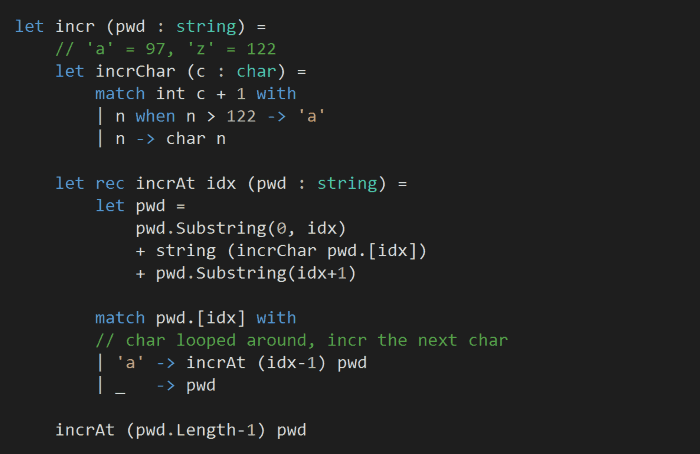
Yan Cui
I help clients go faster for less using serverless technologies.
The source code for this post (both Part 1 and Part 2) is available here and you can click here to see my solutions for the other Advent of Code challenges.
Description for today’s challenge is here.
First, let’s encapsulate the three password requirements:
1) Passwords must include one increasing straight of at least three letters, like abc, bcd, cde, and so on, up to xyz. They cannot skip letters; abd doesn’t count.

2) Passwords may not contain the letters i, o, or l, as these letters can be mistaken for other characters and are therefore confusing.

3) Passwords must contain at least two different, non-overlapping pairs of letters, like aa, bb, or zz.

Any valid password would need to satisfy all three requirements:

Now that’s taken care of, let’s focus on the matter of increasing the password:

here we have broken up the logic into two smaller chunks:
- incrChar is responsible for return the incremented characters, and looping from ‘z’ to ‘a’
- incrAt increments the char at the specified index, and recurses to increment the next index if the aforementioned char loops around
Finally, let’s generate the sequence of all future passwords with an unfold, and find the first one that is a valid password:

Part 2
Almost identical to Part 1, the only change is to skip the first valid password after the initial input:

Whenever you’re ready, here are 3 ways I can help you:
- Production-Ready Serverless: Join 20+ AWS Heroes & Community Builders and 1000+ other students in levelling up your serverless game. This is your one-stop shop for quickly levelling up your serverless skills.
- I help clients launch product ideas, improve their development processes and upskill their teams. If you’d like to work together, then let’s get in touch.
- Join my community on Discord, ask questions, and join the discussion on all things AWS and Serverless.

Here’s a fun trick I just learned. If you have a char c, you can increment it with (c + ‘x01’).
Nice, that’s nicer than converting-to-int-incr-then-back-to-char :-)